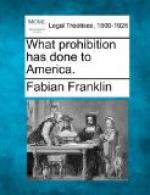effective through the power of the Government, the
dictates of the moral sense of practically all mankind;
and if, in the case of some kindred crimes, it goes
beyond those dictates for special reasons, the extension
is only such as is called for by the circumstances.
However desirable it may be that the sudden transformation
of an innocent act into a crime by mere governmental
edict should carry with it the same degree of respect
as is paid to laws against crimes which all normal
men hold in abhorrence, it is idle to expect any such
thing; and in a case where the edict violates principles
which almost all of us only a short time ago held
to be almost sacred, the expectation is worse than
merely idle. A nation which could instantly get
itself into the frame of mind necessary for such supine
submission would be a nation fit for servitude, not
freedom. But in the case of the Prohibition Amendment,
and of the Volstead act for its enforcement, there
enters another element which must inevitably and most
powerfully affect the feelings of men toward the law.
Everybody knows that the law is violated, in spirit
if not in letter, by a large proportion of the very
men who imposed it upon the country. Members
of Congress and of the State Legislatures—those
that voted for Prohibition, as well as those that
voted against it—have their private stocks
of liquor like other people; nor is there any reason
to believe that many of them are more scrupulous than
other people in augmenting their supply from outside
sources. One of the means resorted to by the Anti-Saloon
League in pushing through the Amendment was the particular
care they took to make its passage involve little
sacrifice of personal indulgence on the part of those
who were wealthy enough, or clever enough, to provide
for the satisfaction of their own desires in the matter
of drink, at least for many years to come. The
League knew perfectly that in some Prohibition States
the possession of liquor was forbidden as well as
its manufacture, transportation and sale; but the AntiSaloon
League would never have dared to include in the Amendment
a ban upon possession. Congressmen who voted
for it knew that not only they themselves, but their
wealthy and influential constituents, would be in
a position to provide in very large measure for their
own future indulgences; and it may be set down as
certain that had this not been the case, opposition
to the Amendment would have been vastly more effective
than it was. In order that a person should entertain
a genuine feeling that the Prohibition Amendment is
entitled to the same kind of respect as the general
body of criminal law, it is necessary—even
if he waives all those questions of Constitutional
principle which have been dwelt upon in previous chapters—that
he should regard drinking as a crime. And this
is indeed the express belief of many upholders of
the Amendment—a foolish belief, in my judgment,
but certainly a sincere one. I have before me
a letter—typical of many—published




